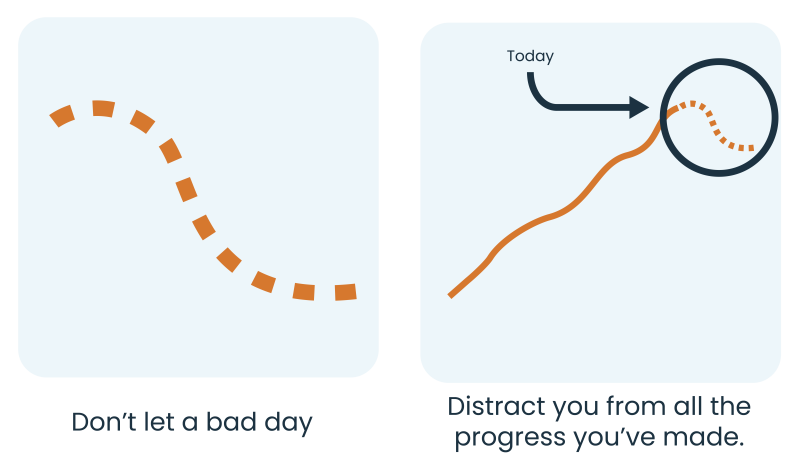Most of the time, hearing the word “setback” can stir up negative emotions or feelings. However, setbacks are a natural and important part of managing diabetes—they are to be expected! Accepting setbacks without self-judgment helps pave the way for long-term success. While this may seem counterintuitive, learning to navigate and master these moments can ultimately be beneficial.
As much as we’d like to manage diabetes in a perfectly controlled environment, life often doesn’t allow for it. The world around us keeps moving, with birthdays, holidays, busy work and family schedules, unexpected problems, and constant change. These situations can sometimes trigger us to fall back into old patterns that don’t align with our health goals.
By understanding and anticipating these moments, we can approach them with compassion and build resilience for the future.
Strategies for Navigating and Overcoming Setbacks
1. Acknowledge Setbacks
Accept setbacks as a normal part of your growth and health management process. Be kind to yourself and allow grace before refocusing on your goals.
2. Recognize and Redirect “All or Nothing” Thinking
Black-and-white thinking can often hinder progress, as most of life unfolds in shades of gray. Expecting perfection is unrealistic and can lead to feelings of failure or diminished self-worth if goals aren’t met perfectly. Progress does not require perfection—it requires persistence.
Example:
Black-and-white thinking: “I said I wouldn’t eat more than one serving of dessert in a day, but today I had a piece of cake and two bowls of ice cream. I’ve failed and will never meet my target A1C.”
Shades of gray thinking: “I’ve consistently met my goal for the past two months. Today was a slip-up, but I’ve made great progress overall, including lowering my average blood glucose and losing 2 pounds. I can refocus and keep moving forward.”
3. Tula Tip
Journaling daily within the myTula app can help you reflect on your progress over time, not just on the moments where things don’t go as planned. Track not only your numbers but also how you feel—energized, stressed, happy, tired, or calm. Looking back on these records can help you reframe setbacks in a positive light and focus on the “shades of gray” in your journey.

4. Reflect and Learn: Take a moment to analyze what contributed to the setback. Was it triggered by a specific situation, a change in routine, or an emotional response? Reflecting on these factors can provide valuable insight. Record your thoughts in your myTula app Trackables or discuss them with your HealthCoach! Identifying the cause can help you build strategies to avoid similar challenges in the future.
5. Set Realistic Goals: Start small and give yourself some flexibility. For example, if you aim to walk 5 days a week but aren’t consistent yet, set a goal to walk 3 days a week. This leaves room for busy days, fatigue, or unexpected obstacles like rainy weather. Once you’ve established consistency, you can gradually increase your target.
6. Build a Support System: Surround yourself with people who support your journey—friends, family, your LIVE TULA team, or support groups. This can mean having open conversations about goals, sharing wins and challenges, or simply connecting. A strong network can offer encouragement, advice, and accountability when you need it most.
7. Flexible Planning: Adaptability is key! If a plan isn’t working, don’t hesitate to reassess and make changes. Flexibility allows you to respond to challenges while staying focused on your long-term goals.
Eleanor Roosevelt once said, “Be flexible, but stick to your principles.” This wisdom reminds us that adaptability is a strength, especially when it allows you to discover what works best for your unique situation without compromising your core values. Flexibility empowers growth and resilience while staying true to what matters most.
Example
Original Goal: Reverse diabetes and get off insulin.
Setback: After six months, achieving this feels impossible, and I’ve lost motivation to make any changes.
New Goal: Prioritize hydration to see its effect on blood glucose and try new recipes from the LIVE TULA Dietitian twice a week.
Result: My insulin use has been cut in half, and I’m continuing to make progress! I feel motivated to set and achieve new goals.
“A tree that is unbending is easily broken”
8. Celebrate Small Wins: Acknowledge and appreciate every step forward, no matter how minor it may seem. It’s easy to focus on the challenges still ahead without recognizing the significant progress you’ve already made. Celebrating these milestones can build motivation and confidence. Lean on your support system, including your Tula HealthCoach, to help you identify and celebrate your achievements!
Remember, it’s not about how many times you fall but how many times you rise. Each time you pick yourself up, you build resilience and learn strategies to prevent similar challenges in the future. Setbacks are not failures—they’re stepping stones that guide you closer to your goals. Embrace them as opportunities to reassess, adjust, and refine your approach. True resilience isn’t just about recovering; it’s about growing stronger, gaining wisdom, and moving forward with renewed determination and insight. Every stumble offers a lesson that strengthens your path ahead.
Sending Health Your Way!
The Tula Clinical Team
Austin MS, RDN, CSR, LDN, CD
Aubree RN, BSN
Tula Takeaways |
|---|
| 1. Be Realistic: Setbacks are a normal part of progress. Nobody is perfect, and perfection isn’t required to reach your goals. Acknowledge your efforts so far—you’re doing great! |
| 2. Stay Flexible: Plan a weekly outing to your favorite park, bookstore, or coffee shop, and bring your written goals or plans with you. Use this time to reflect on your weekly HealthActivities and ensure your priorities align with your values. Setting realistic goals that adapt to your needs can make overcoming setbacks much easier. |
| 3. Celebrate Your Efforts: Acknowledge the progress you’ve made! If you’re reading this, you’re already taking proactive steps toward better health, and that’s something to celebrate. Every effort counts on your path to success |
The LIVE TULA blog is informational and not medical advice. Always consult your doctor for health concerns. LIVE TULA doesn’t endorse specific tests, products, or procedures. Use the information at your own risk and check the last update date. Consult your healthcare provider for personalized advice.






